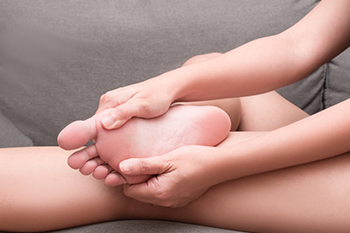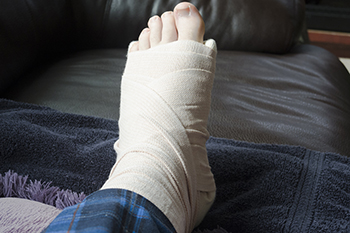
Sesamoiditis causes pain beneath the big toe due to irritation or injury of the sesamoid bones, which are two small, round bones located under the head of the first metatarsal. These tiny bones are embedded in a tendon and assist with weight-bearing and toe movement. When exposed to repetitive stress, direct trauma, or altered foot mechanics, they can become painful, especially during walking or when wearing thin-soled or high-heeled shoes. Sesamoiditis more commonly affects dancers, joggers, and people with high arches or bunions. Symptoms include toe pain that gets worse with pressure, and swelling, warmth, or redness may occur near the joint. A podiatrist can perform an exam to pinpoint areas of tenderness and assess the structure of the foot. Imaging may be used to rule out fractures or other joint conditions. Treatment often involves changes in footwear and the addition of custom orthotics to reduce pressure on the sesamoids. In severe or prolonged cases, surgery may be recommended. If you are experiencing pain under the big toe, it is suggested that you schedule an appointment with a podiatrist for an exam and appropriate treatment.
Sesamoiditis is an unpleasant foot condition characterized by pain in the balls of the feet. If you think you’re struggling with sesamoiditis, contact one of our podiatrists of Arcadia Foot and Ankle. Our doctors will treat your condition thoroughly and effectively.
Sesamoiditis
Sesamoiditis is a condition of the foot that affects the ball of the foot. It is more common in younger people than it is in older people. It can also occur with people who have begun a new exercise program, since their bodies are adjusting to the new physical regimen. Pain may also be caused by the inflammation of tendons surrounding the bones. It is important to seek treatment in its early stages because if you ignore the pain, this condition can lead to more serious problems such as severe irritation and bone fractures.
Causes of Sesamoiditis
- Sudden increase in activity
- Increase in physically strenuous movement without a proper warm up or build up
- Foot structure: those who have smaller, bonier feet or those with a high arch may be more susceptible
Treatment for sesamoiditis is non-invasive and simple. Doctors may recommend a strict rest period where the patient forgoes most physical activity. This will help give the patient time to heal their feet through limited activity. For serious cases, it is best to speak with your doctor to determine a treatment option that will help your specific needs.
If you have any questions please feel free to contact our offices located in Scottsdale, North Scottsdale, Mesa, and Sun City, AZ . We offer the newest diagnostic and treatment technologies for all your foot and ankle needs.

A foot stress fracture is a small crack in a bone that develops due to repetitive stress rather than a sudden injury. It commonly occurs in athletes, especially runners, and individuals who engage in high-impact activities. Causes include overuse, sudden increases in physical activity, and inadequate rest between workouts. Symptoms often begin with mild discomfort that worsens with weight-bearing activities, progressing to persistent pain, swelling, and tenderness in the affected area. Risk factors include footwear that lacks adequate support and cushioning, poor biomechanics, and conditions like osteoporosis that weaken bones. Individuals with a history of stress fractures or nutritional deficiencies may also be more susceptible. If you have symptoms of a foot stress fracture, it is suggested that you schedule an appointment with a podiatrist who can accurately diagnose and treat this condition.
Activities where too much pressure is put on the feet can cause stress fractures. To learn more, contact one of our podiatrists from Arcadia Foot and Ankle. Our doctors can provide the care you need to keep your pain free and on your feet.
Dealing with Stress Fractures of the Foot and Ankle
Stress fractures occur in the foot and ankle when muscles in these areas weaken from too much or too little use. The feet and ankles then lose support when walking or running from the impact of the ground. Since there is no protection, the bones receive the full impact of each step. Stress on the feet can cause cracks to form in the bones, thus creating stress fractures.
What Are Stress Fractures?
Stress fractures occur frequently in individuals whose daily activities cause great impact on the feet and ankles. Stress factors are most common among:
- Runners
- People affected with Osteoporosis
- Tennis or basketball players
- Gymnasts
- High impact workouts
Symptoms
Pain from the fractures occur in the area of the fractures and can be constant or intermittent. It will often cause sharp or dull pain with swelling and tenderness. Engaging in any kind of activity which involves high impact will aggravate pain.
If you have any questions please feel free to contact our offices located in Scottsdale, North Scottsdale, Mesa, and Sun City, AZ . We offer the newest diagnostic and treatment technologies for all your foot and ankle needs.

A broken foot can result from direct impact, falls, crush injuries, or repetitive stress. Symptoms include pain, swelling, bruising, limping, and difficulty bearing weight. The severity of a foot fracture depends on which of the 26 bones in the foot is affected. A podiatrist can diagnose your injury using X-rays or advanced imaging such as a CT scan. Treatment may involve immobilization with a stiff-soled shoe, boot, or brace to support healing. Some fractures, particularly those that involve joint surfaces or cause displacement, may require surgery to restore alignment. One possible complication of a foot fracture is non-union, which occurs when a broken bone fails to heal properly due to poor blood supply, continued movement at the fracture site, or other factors. This can lead to chronic pain and instability in the foot. Other complications include arthritis, if a joint is involved, and infection if the skin is broken. Recovery time depends on the type and location of the fracture. If you have a broken foot bone, it is suggested that you schedule an appointment with a podiatrist for an exam, diagnosis, and treatment options, which may include surgery.
A broken foot requires immediate medical attention and treatment. If you need your feet checked, contact one of our podiatrists from Arcadia Foot and Ankle. Our doctors can provide the care you need to keep you pain-free and on your feet.
Broken Foot Causes, Symptoms, and Treatment
A broken foot is caused by one of the bones in the foot typically breaking when bended, crushed, or stretched beyond its natural capabilities. Usually the location of the fracture indicates how the break occurred, whether it was through an object, fall, or any other type of injury.
Common Symptoms of Broken Feet:
- Bruising
- Pain
- Redness
- Swelling
- Blue in color
- Numbness
- Cold
- Misshapen
- Cuts
- Deformities
Those that suspect they have a broken foot shoot seek urgent medical attention where a medical professional could diagnose the severity.
Treatment for broken bones varies depending on the cause, severity and location. Some will require the use of splints, casts or crutches while others could even involve surgery to repair the broken bones. Personal care includes the use of ice and keeping the foot stabilized and elevated.
If you have any questions please feel free to contact our offices located in Scottsdale, North Scottsdale, Mesa, and Sun City, AZ . We offer the newest diagnostic and treatment technologies for all your foot and ankle needs.
